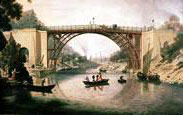June 2009
Centre for Urban History

Welcome to Urban History News - a monthly digest of news and information for the urban history community.
STOP PRESS....
Show your support for Urban History
Urban History is currently not included in the Arts and Humanities Citation Index published by Thomson. This is an international index used to rate different journals in science and the arts and humanities. Increasingly organisations such as Universities are using the index to evaluate the research of their academics. It is of considerable importance to the Journal’s international reputation that it should be included.
The editors are working with CUP on an application to Thomson for the journal to be included in the index, but we are advised that this application will have more weight if we can get a recommendation campaign going. Thomson have an online form for recommending science journals but we can also use it to recommend humanities journals (they don't have a form for humanities which is indicative of their lack of real interest in the area).
We would be very grateful if readers of UHN could take the time (only a few minutes) to make a recommendation through thomsonreuters.com
The journal website, should you wish to refresh your memories is http://journals.cambridge.org/uhy
CENTRE FOR URBAN HISTORY
Scholarship MA Urban History
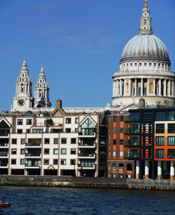 The Centre for Urban History is offering a fees only, full-time scholarship for students wishing to study the MA Urban History: Conservation, Heritage and Planning.
The Centre for Urban History is offering a fees only, full-time scholarship for students wishing to study the MA Urban History: Conservation, Heritage and Planning.
The Scholarship will be offered for MA students who wish to begin their study in 2009/10. Students with interests in conservation, heritage and/or urban poverty are encouraged to apply.
To apply students must submit a University application form and the School Bursary Application Form by 26 June 2009. Applications can be submitted before receipt of degree results.
Application details
MA Urban History: Conservation, Heritage and Planning
 CENTRE FOR URBAN HISTORY
CENTRE FOR URBAN HISTORY
GRADUATE CONFERENCE
PLACE IN HISTORY - HISTORIES OF PLACE
02 October 2009
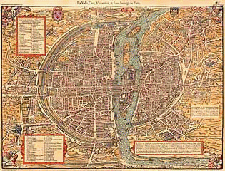 Urban settlement is dependent upon location with the obvious requirements of food and water being of primary consideration for settlers. But beyond that, what part do space and place play in the development of a community or locale? What emphasis should historians place on the material environment of a place and how should they analyse the relationship between people and that environment? How does the study of landscape and environment contribute to our understanding of the urban past? This conference encourages consideration of new (and old) approaches to the interaction of people and place across medieval, early modern and modern periods.
Urban settlement is dependent upon location with the obvious requirements of food and water being of primary consideration for settlers. But beyond that, what part do space and place play in the development of a community or locale? What emphasis should historians place on the material environment of a place and how should they analyse the relationship between people and that environment? How does the study of landscape and environment contribute to our understanding of the urban past? This conference encourages consideration of new (and old) approaches to the interaction of people and place across medieval, early modern and modern periods.
Graduate students and early-career researchers are invited to submit 200-300 word abstracts for 20-25 minute papers relating to the conference theme by July 31st 2009.
PhD Studentship 'Glasgow's War and the Challenge to Masculinity in the Reserved Occupations, 1939-1945' ![[external link]](../../images/formatting/externalsite.gif)
Scottish Oral History Centre ad Glasgow Museums
The Scottish Oral History Centre at the University of Strathclyde has been awarded an AHRC Collaborative Doctoral Studentship in partnership with Glasgow Museums for the topic ‘Glasgow's War and the Challenge to Masculinity in the Reserved Occupations, 1939-1945: Recovering Gender Identities in Oral Narratives and Public History'. The PhD will be supervised by Professor Arthur McIvor and Dr Juliette Pattinson at Strathclyde and Dr Martin Bellamy at Glasgow Museums and will start 1st October 2009.
![]() Women’s Life and Leisure in the Twentieth Century
Women’s Life and Leisure in the Twentieth Century
21 November 2009 • Stoke-on-Trent, UK
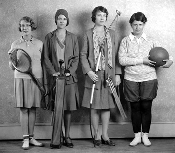 The Women's History Network (Midlands Region) invites papers on all aspects of women’s lives and leisure in the twentieth century including: sport, drama, media, domestic and working life.
The Women's History Network (Midlands Region) invites papers on all aspects of women’s lives and leisure in the twentieth century including: sport, drama, media, domestic and working life.
This one day conference is to be held at the Stoke on Trent campus of Staffordshire University.
![]() Early Modern Dis/Locations
Early Modern Dis/Locations
15-16 January 2010 • Newcastle, UK
The organisers invite scholars and students working in literary and cultural studies, history, geography, philosophy, and related disciplines to submit 200 word abstracts for 20-25 minute papers by July 31st 2009 (please note this is an extended deadline). Themes and questions include:
- What were the significant locations for and of early modern cultures, and why?
- To what extent were locations conceived and constructed as gendered, rank-specific, desirable, or disgusting?
- How were all such locations experienced (and by whom), and represented in literature, art, and philosophy?
- How was dislocation caused, theorized and represented in the period?
Midlands History Postgraduate Conference
14 November 2009 • Leicester, UK
The conference is sponsored by the journal Midland History. All postgraduates and others researching the history of the Midlands are welcome to attend. Papers will cover aspects of the history of the counties of Bedfordshire, Derbyshire, Gloucestershire, Herefordshire, Leicestershire, Lincolnshire, Northamptonshire, Nottinghamshire, Oxfordshire, Rutland, Shropshire, Staffordshire, Warwickshire and Worcestershire.
Borders and Identities ![[external link]](../../images/formatting/externalsite.gif)
08-09 January 2010 • Newcastle, UK
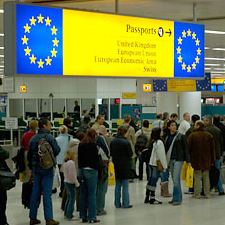 The Borders and Identities Conference (BIC2010) is organised under the auspices of the Accent and Identity on the Scottish/English Border (AISEB
The Borders and Identities Conference (BIC2010) is organised under the auspices of the Accent and Identity on the Scottish/English Border (AISEB ![[external link]](../../images/formatting/externalsite.gif) ) project. The meeting has two aims:
) project. The meeting has two aims:
1) to demonstrate the current state of knowledge in this fast-developing area of sociolinguistic inquiry,
and
2) to provide an interdisciplinary perspective in order that the results of recent sociolinguistic studies on the topic can be contextualised in broader social scientific discourse.
The principal objective in organising the meeting is to foster new collaborative research initiatives by bringing together scholars in allied disciplines, with a view to extending and refining our understanding of the language-identity nexus in regions where in-group and out-group categorisations may be problematic, or at least more salient than elsewhere.
Midland History
PRIZE
The MIDLAND HISTORY PRIZE, worth £200, is offered in 2009 for the best essay submitted on an historical subject relating to midland England. Candidates must not, at the date of submission, have a published book or an article in a major journal. The essay must be a genuine work of original research, not hitherto published or accepted for publication, and must reach the required standard. The text should not exceed 8,000 words. Candidates must consult the style sheet of Midland History, avarlable from the Editor and must submit their choice of subject to the Editor for approval before
sending their essay. Essays must reach the Editor of Midland History by 31st October 2009. The winning essay, and others judged meritorious, will be published in Midland History.
upcoming events...
10-13 June 2009
Vernacular Architecture Forum Annual Meeting ![[external link]](../../images/formatting/externalsite.gif)
Butte, Montana, USA
12-13 June 2009
Sex in the Cities ![[external link]](../../images/formatting/externalsite.gif)
Lviv, Ukraine
16-18 June 2009
Religion, gender, industry ![[external link]](../../images/formatting/externalsite.gif)
Madeley/Telford, UK
17-20 June 2009
The Cost of War ![[external link]](../../images/formatting/externalsite.gif)
Liverpool, UK
02-03 July 2009
Anglo-American conference of historians ![[external link]](../../images/formatting/externalsite.gif)
London, UK
03-04 July 2009
Hearing Voice in Oral History ![[external link]](../../images/formatting/externalsite.gif)
Strathclyde, UK
03-04 July 2009
'Cities of Business, the Business of Cities…' ![[external link]](../../images/formatting/externalsite.gif)
Liverpool, UK
09-10 July 2009
Literary London 2009
London, UK
14-18 July 2009
Sport in History ![[external link]](../../images/formatting/externalsite.gif)
Stirling, UK
approaching deadlines...
19 June
AHRC Collaborative Doctoral Award: Oral Narratives & Public History ![[external link]](../../images/formatting/externalsite.gif)
26 June
CUH Scholarship
30 June
 The Blitz and its legacy
The Blitz and its legacy
01 July
 Borders and Identities
Borders and Identities ![[external link]](../../images/formatting/externalsite.gif)
10 July
 Women’s Life and Leisure in the Twentieth Century
Women’s Life and Leisure in the Twentieth Century
31 July CUH Graduate Conference
CUH Graduate Conference Early Modern Dis/Locations
Early Modern Dis/Locations
Conference report...
Venal Bodies: Prostitutes and Prostitution in Eighteenth Century Culture
04 April 2009 – Institute of Germanic and Romance Studies, University of London
The conference held in London at the centre of Germanic studies at the beginning of April took mainly a literary approach to the subject of prostitution. Even though the organizers wished to encourage approaches from different disciplines of research, they chose to concentrate on papers which took a literary text (memoirs, novels) as the basis of analysis.... [more]
CUH seminars...
CUH Seminar Series 2009-10:
2009-10 marks the 25th Anniversary Year at CUH. A celebratory seminar programme is being developed.
other seminar series...
Historical Perspectives: Work in Progress Seminars ![[external link]](../../images/formatting/externalsite.gif)
Glasgow, UK
Chicago History Museum
Chicago, USA
Healthcare in Theory and Practice in Twentieth Century Britain ![[external link]](../../images/formatting/externalsite.gif)
Centre for the Social History of Health and Healthcare Seminar Series at Glasgow Caledonian University
Ottoman Urban Studies
ZMO-EUME-Colloquium, Berlin
Scottish Oral History Society ![[external link]](../../images/formatting/externalsite.gif)
For further details please contact Professor Arthur McIvor.
exhibitions...
London's Burning ![[external link]](../../images/formatting/externalsite.gif)
Online exhibition
The Ironbridge Gorge Museum Trust has events throughout 2009 to celebrate 300 years of the Industrial Revolution.
Deadline for next issue:
01 July 2009
Back copies of UHN remain on-line for 6 months. Earlier issues are available on request.
Articles for the newsletter and diary should be emailed to uhn@le.ac.uk. It is requested that items for the newsletter are submitted in English.
To subscribe to UHN send an email marked 'Subscribe UHN' in the subject line.
To unsubscribe please send an email marked in the subject line 'Newsletter unsubscribe'.
